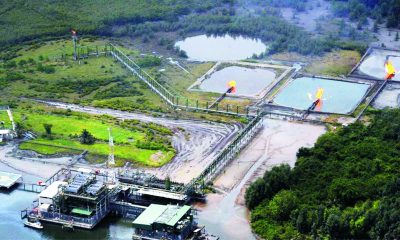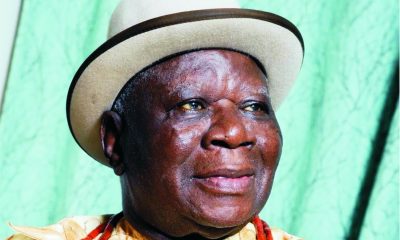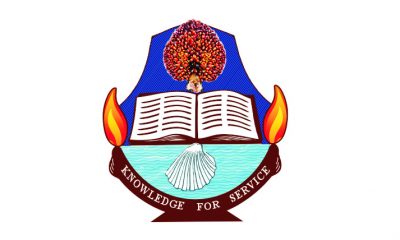Rivers
New NDDC Board And Stakeholders’ Expectations
On Tuesday, Nov. 29, President Goodluck Jonathan inaugurated a new board for the Niger Delta Development Commission (NDDC), with a stern warning that it should not dabble into the political intrigues of the Niger Delta region.
Jonathan, who gave the warning after the inauguration of the 18-man board in Abuja, called on the new NDDC board, which has Dr Tariah Tebepah as its Chairman, to learn from the errors of their predecessors by avoiding partisan politics.
“I believe you will learn from the mistakes of your immediate predecessors. I always emphasise that people must not play politics with the development of our people.
“The past board was camping all kinds of criminals in hotels in the name of helping politicians. If I hear that, I will be very angry with you. You must focus on the development of the Niger Delta…,’’ he said.
Jonathan also called on the new board to set new performance standards in the Niger Delta region.
He appealed to the board, which is expected to serve out the tenure of the board dissolved in September, and the Federal Ministry of Niger Delta Affairs to complement the training of repentant militants under the Niger Delta Amnesty Programme by initiating skills’ acquisition programmes for other youths in the region.
The board members are Dr Christian Obo (Managing Director), Mr. L.E.J. Konbaye (Executive Director, Finance & Accounts), Mr Edikan Eshett (Executive Director, Projects) Mr Edward Orubo, Dr Ibitamuno Aminigo, Chief Solomon Ogba, Mr Imaobong Johnson and Mr Aloysius Nwagboso.
The new board also includes Mr Omogbemi Oladele, Mr Peter Ezeobi, Mr Dominic Aqua Edem, Mr Osabon Imaru, Mr Joe Jakpa, Sen. Garba Yakubu Lado, Rima Shawulu Kwewum, Sen. Tunde Ogbeha.
The Minister of State for Finance, Dr Yerima Ngama, and the Minister of Environment, Mrs Hadiza Mailafa, are also members of the board.
Speaking after the board’s inauguration, the board’s Chairman, Tebepah, pledged that his team would strive to meet the people’s expectations, adding that they would also work in line with the transformation agenda of the Jonathan administration.
The journey toward the new board began on Sept. 13, when President Goodluck Jonathan formally announced the dissolution of the third Board of Directors and management of the NDDC.
The board was chaired by retired AVM Larry Koinyan, while the Mr Chibuzor Ugwuoha was the commission’s Managing Director. Messrs Power Aghinighan and Esoetok Etteh were the Executive Director (ED) of Finance and Administration and the Executive Director of Projects respectively in the dissolved board.
NDDC was established in 2000 by the administration of former President Olusegun Obasanjo as an interventionist agency to foster development in the Niger Delta area in a structured, coordinated manner.
The commission had two previous management boards. The first was chaired by Chief Onyema Ugochukwu from Abia, while the second was headed by Amb. Sam Edem from Akwa Ibom.
The two boards witnessed some crises which, according to observers, believed hindered their efforts to alleviate the sufferings of the Niger Delta people via purposeful programmes.
The third board, which was inaugurated by former President Umaru Yar’Adua on Aug. 6, 2009, however, failed to douse the crisis, as the government and the people sooner got fed up with the crises trailing the boards’ assignment.
The board was, therefore, dissolved in September, following the recommendations by an administrative panel of inquiry constituted by Chief Anyim Pius Anyim, the Secretary to Government of the Federation (SGF).
Problems started in the third NDDC board on Dec. 14, 2009 when Aginighan, the ED (Finance and Administration), reported Ugwuoha, the Managing Director, to the board chairman, Kionyan, accusing him of non-compliance with a directive regarding the change of signatories to the commission’s bank accounts.
Besides, there was a disagreement between the Koinyan-led board and Ugwuoha over the management of some NDDC projects worth N69 billion.
The board also queried alleged transfer of $20 million (about N3 billion) from the NDDC’s account in Britain’s Union Bank to the UK branch of First Bank Plc. and this led to the inauguration of the administrative panel chaired by Mr Steve Oronsaye, which finally led to the board’s dissolution.
While the crisis lasted, observers noted that most projects awarded by the commission were either poorly executed or abandoned by contractors, as little attention was given to the projects’ supervision by NDDC officials.
Apparently irked by the controversies that affected the service delivery of successive NDDC management teams, many stakeholders stress the need for the government to appoint persons who could oversee the implementation of the commission’s master plan into its board.
Observers recall that about 10 years ago, the NDDC initiated a development master plan that was hinged on a comprehensive analysis of the development, imperatives, challenges and opportunities in the Niger Delta area.
The plan, which noted that the Niger Delta region is rich in human and natural resources, however, stressed that poverty was widespread in the area
Noting the high incidence of diseases and infant mortality in the area, the plan stressed the need to tackle the region’s poor sanitation, while boosting its industrial development.
It also underscored the need to develop the area’s transportation system, while addressing problems relating to erratic electricity supply, poor education and health facilities.
Besides, the plan outlined vast opportunities existing in agricultural production and crop processing, aqua culture, livestock production and solid minerals exploitation, as well as in oil and gas development ventures in the upstream and downstream sectors.
Observers, nonetheless, bemoan the failure to record substantial achievements in the Niger Delta area’s development, 10 years after the launch of the master plan, insisting that this constitute a food for thought for the new NDDC board.
Stakeholders, nonetheless, urge the new board members should strive to give quality service delivery and avoid the temptation of viewing their appointments as a chance to have a cut in the national cake.
Chief Don Ubani, Abia State’s Commissioner for Information and Strategy, stressed that the new NDDC board must be conversant with the rationale behind the commission’s establishment and work towards actualising the specific objectives.
“NDDC as an agency set up to make the people of Niger Delta region happy as a result of their God-given natural resources, which also serve as the economic nerve-centre of the nation.
“If the new board members go for personal aggrandisement at the expense of the overall interests of the region, that will scuttle the vision of the founding fathers of the NDDC and the government,’’ he said.
Ubani emphasised that the internal squabbles which affected the functions of the last board of directors should be avoided by the new management team.
“The last board of the NDDC was enmeshed with internal squabbles which defeated the objective of their assignment,’’ he said.
On his part, Mr Sampson Akanimo, a conservationist, urged members of the new NDDC board to refrain from the temptation of having the notion that their appointments were some kind of political rewards.
Akanimo, who hails from Akwa Ibom, noted that many people in the Niger Delta area viewed the NDDC’s operational approach, since its inception, as not purposeful enough.
“In the area of infrastructure development, the NDDC ought to have completed the construction of the Niger Delta Coastal Road and the development of new towns in each of the nine constituent states of the region, as stated in the master plan,’’ he said.
Akanimo suggested that the services of professional developers should be engaged by the NDDC, just like the United Nations Development Programme (UNDP), to oversee the implementation of the commission’s projects.
‘The new board should not be a ‘merry-go-round’ board. The board should work like the UNDP, so as to facilitate the proper implementation of the projects which the NDDC master plan contains.
“The people are eager to see the NDDC master plan, drawn up by Chief Onyema Ugochukwu-led board of directors, implemented to the letter. This is because most of the projects initiated outside the plan have all collapsed,’’ he said.
He urged the new board to always follow the due process in all their transactions, particularly those concerning contract awards, while urging the government to investigate and punish past corrupt officials to serve as deterrent to others.
Akanimo urged oil bearing communities in the region to adopt the UNEP Report on the Environmental Assessment of Ogoniland as a benchmark for addressing environmental degradation cases in the entire Niger Delta region.
“Niger Delta communities, whether in Izombe, Imo state, Eket, Akwa Ibom, Obirikom or Rivers, should all adopt the Ogoni UNEP report as an instrument for addressing perceptible environmental concerns.
“Our belief is that all ecosystem and human ecosystem are the same; the activities of these oil companies have resulted in people living under dreadful conditions — in squalor and abject poverty,’’ Akanimo said.
Mr Ledum Mitee, President of Movement of Survival of Ogoni People (MOSOP), said that the government had been talking about implementing youth-empowerment policies, adding, however, that the actions so far taken by the government to address the needs of the youth were very inadequate.
“Economic policies in the region have of late been afflicted by what could be termed ‘Acute Youth Deficiency Syndrome’, policy bereft of the youths’ interests,’’ he said.
Mitee also noted that government at all levels, interventionist agencies and oil firms must necessarily pursue a youth policy that was different from the current tactics of placating the most violent or militant segment of the youth.
“Such pacification approach should not be allowed to continue, as it only tends to reinforce militancy and violence,’’ he said.
However, Mr Martins Amabipi, a Port Harcourt-based public relations practitioner, stressed the need for the new NDDC board to sanitise the commission and reposition it for effective service delivery.
“Right from the inception of Oil Mineral Producing Areas Development Commission (OMPADEC) to the current NDDC set-up, the system has been embroiled in crises and corruption. This development defeats the rationale behind the establishment of the commission.
“Fortunately, the people’s expectations are still high but if the menace of corruption is not adequately tackled, it will be extremely difficult to implement the master plan for the Niger Delta’s development, drawn up by the administration of Ugochukwu,’’ he said.
Mr Paulyn Igbokwe, who hails from Izombe, an oil-bearing community in Imo, said that the new board should visit some of the sites of the projects executed by past NDDC management to ascertain the state of the projects.
“If you tour project sites such as the Mgbele-Izombe and Izombe-Agwa road projects, where the NDDC claimed to have carried out mega construction works, you will see how one 4-km road was cut into two parts, forcing road users to have a harrowing experience while travelling on the road,” he said.
Igbokwe, nonetheless, urged the new board to seek the communities’ input into projects before embarking on such projects so as to forestall the waste of scarce resources on projects with little or no impact on the people’s living standards.
“In Izombe, for instance, we no longer want boreholes that dry off a year after construction. NDDC should help in the design of a development blueprint for Izombe so as to give the town a decent look, in line with its status as an emerging metropolitan area in Imo State,’’ he said.
Mr Prince Biira, the Chairman of a coalition of youth groups in Rivers, who commended the President for dissolving the former NDDC board, however, advised the new management of the commission to refrain from any kind of maladministration.
“I feel the board’s dissolution has satisfied our yearning that the activities of the NDDC ought to be probed. We now expect the new board to shun all acts of corruption because youths will not tolerate such aberration if noticed, ” he said.
Sharing similar sentiments, Mr Onengiya Erekosime, the President of Foundation for Peace and Non-Violence in Nigeria, urged the new NDDC board to be wary of the activities of some youth groups who were fond of loitering around the NDDC headquarters in Port Harcourt.
“These groups are ready tools in the hands of some unscrupulous politicians who usually sponsor them to protest against any NDDC official who is not protecting their interests,’’ he said.
Erekosima advised the new board not to fall prey to the antics of such youth groups, stressing that it should rather evolve a pragmatic youth empowerment policy which will enable the area’s youths to discover their talents and live useful lives.
Observers concede that a lot of work awaits the new NDDC board in implementing the projects identified in the master plan for the Niger Delta area’s development.
They, nonetheless, advise the new management team to shun bickering and corruption in all their efforts to transform the development of the area.
Onyeukwu writes for News Agency of Nigeria.
Francis Onyeukwu
Rivers
Experts Urge Fubara On Youth Marine Safety Training
Rivers
Association Boss Urges For Professionalism, Efficiency Among Memebers
Rivers
Redeem Your Financial Pledges, Oxfam Urges Nations
-
Niger Delta3 days ago
Delta Approves N275bn For 76 Projects Execution
-
Features3 days ago
A Farewell To Arms In Ogoni
-

 Business3 days ago
Business3 days agoNigeria’s Non-Oil Exports Growth Rises 20.7% To $5.45bn In 2024
-
Politics3 days ago
2027: SDP Advocates Principles-Based Alliances For Good Governance
-

 News3 days ago
News3 days agoFubara Expresses Grief, Commiserates With Family Over Death Of Pa Edwin Clark
-
Business3 days ago
NCDMB, Starzs Gas Upbeat On Industrialisation …Unveil CNG Project In Delta
-

 Niger Delta3 days ago
Niger Delta3 days agoUNICAL VC Institutes Scholarship To Reward Academic Excellence
-
Sports3 days ago
Aruna Eyes Title Defence, W’Cup At African Cup

